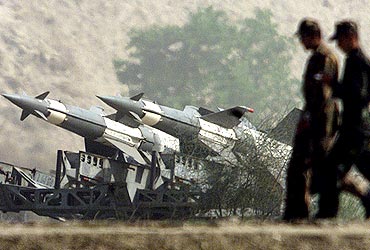
In a report card assessing the progress on nuclear nonproliferation and disarmament in 2009-2010, the independent Arms Control Association headquartered in Washington, DC, has given India an overall C+ grade on an A through F scale. The association rates the performance of 11 key states in 10 universally-recognised categories of non-proliferation, disarmament and nuclear security.
The report said that India earns relatively good grades for actions and policies regarding warning time for nuclear weapons use, export controls, and multilateral nuclear security commitment.
But the ACA -- which was in the forefront of opposition to the India-US civilian nuclear agreement -- said that although India claims to be a 'responsible' nuclear power, it has not taken on many of the obligations that the original five nuclear weapons states have accepted.
Text: Aziz Haniffa in Washington, DC
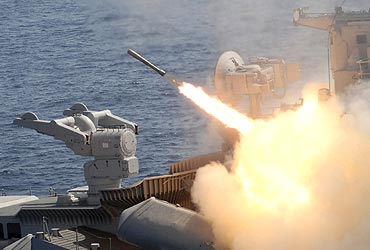
"In particular," the report said, India "continues to build up its nuclear arsenal, including through the production of nuclear weapons material," and added: "Moreover, it has not made a formal commitment to halt nuclear testing by signing the Comprehensive Test Ban Treaty."
Thus, it said, New Delhi had received "low marks in the areas on banning nuclear testing, ending fissile material production, and nuclear force reduction."
The report acknowledged that "unlike other states that maintain their weapons at some degree of heightened readiness, India is believed to keep its nuclear arms separated from its delivery systems, reducing the chances of accidental or miscalculated use."
"It earns one of the top marks among all nuclear-weapons possessor for this stance," the report said.
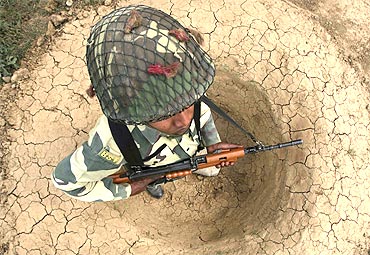
In this category of nuclear weapons alert levels, the 65-page ACA research report, which gave India an A, said, "India's land-based missiles are not believed to be mated with their nuclear warheads, effectively reducing their readiness level and the risk of accidental or unauthorised use."
India received an A grade in Nuclear Security Commitments and an A for Criminalisation and Illicit Trafficking Commitments and an A- in Nuclear Weapons-Related Export Control categories.
For Banning Nuclear Testing, India received a D+, for Ending Fissile Material Production for Weapons, and F, for Nuclear Force Reductions, and F, for Negative Security Assurances, a B+, for Nuclear-Weapon-Free Zones, a C-, and for IAEA (International Atomic Energy Agency) Safeguards, a C+.
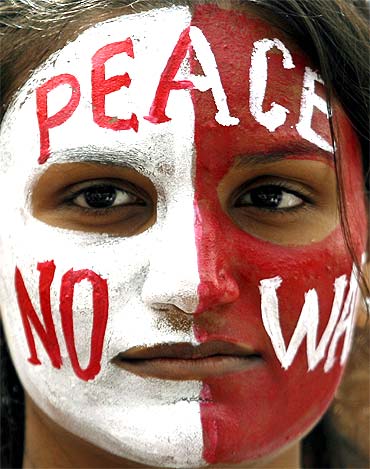
The report said India is believed to be capable of producing nearly 30 kilograms of weapons-grade plutonium each year, but noted that in the coming years, India is expected to short down its CIRUS reactor and start up its Prototype Fast Breeder Reactor, "thereby increasing plutonium production to about 167 kilograms per year."
It also said that although India is known to produce highly enriched uranium for its naval reactors, "it is unknown whether it does so for nuclear weapons."
However, the report noted that independent satellite imagery analysis in March 2010 had assessed that India was "significantly expanding its military uranium-enrichment capacity."
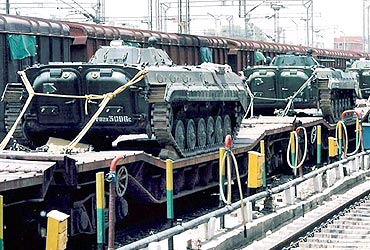

It said that China earned higher grades for its nuclear weapons alert posture and for its declaratory posture of "no first use," which "not only strengthens its commitment not to use nuclear weapons against non-nuclear weapon states, but also leads China away from keeping its weapons on a more ever-ready alert levels maintained by all of the other nuclear weapon states."
However, the report said, "China is the only nuclear-weapon state that is scaling up its nuclear forces, rather than drawing them down, earning it an F grade for nuclear reductions."
It also noted that China has signed but not ratified the CTBT, even though it asserts, as it has for years, that it is pursuing ratification.
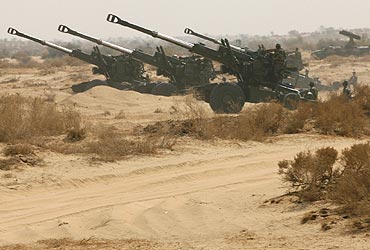
Peter Crail, ACA's nuclear non-proliferation analyst and lead author of the report, said, "The findings of our 2009-2010 Report Card suggest that the global system that has been established over the decades to reduce nuclear weapons dangers is neither on the verge of crumbling nor on the cusp of success."
Daryl Kimball, executive director of ACA and a contributor to the report, said, "Although India claims to be a 'responsible' nuclear power, it has not taken on many of the obligations that are expected of nuclear-armed states."
He argued that "to move further into the nuclear non-proliferation 'mainstream,' both India and Pakistan must take steps that would slow down the nuclear arms race, including codifying their nuclear testing moratoria and halting fissile material production for weapons."